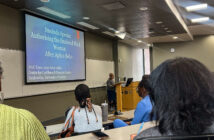There are many options for students to sell their textbooks. Make sure you get the most for yours by following these tips.
The Bookstore:
“I don’t sell books back to the school bookstore much,” Esther Pak, ’18, said. “They offer a lot less than I paid for most times, and I can usually get more money for them elsewhere. The bookstore is more of like a last resort if no one else needs to buy my textbook or if they don’t like the prices I offer.”
The bookstore is one of the less popular ways of selling back textbooks. The store offers only up to 50 percent back for textbooks and even less if the textbook is not in good shape.
Word of Mouth:
Word of mouth is a more common way of to sell unwanted textbooks.
“I usually ask around my dorm or any of my friends if they’re looking for any of the textbooks I have and end up selling it to them,” Sabrina Lee, ’18, said.
Students who use this method usually ask their friends if they need the textbooks they are selling and then agree on a price for it. However, this method has its disadvantages.
“I don’t really like to sell my textbooks to friends,” Noah Marcus, ’18, said. “They always ask me to reduce the price. I’ll sell it to someone I don’t know too well because I know they won’t try to negotiate.”
Facebook:
Christian Dietz, ‘18, suggested a social media-based method of selling textbooks.
“I always check Facebook first,” Dietz said. “It’s really easy. I can either ask if anyone wants to buy the textbook I’m selling, or I can search if anyone has already asked for it on Facebook.”
The Lehigh class Facebook groups let students communicate with hundreds of other students.
“Almost everyone sells textbooks trough Facebook,” Prarthna Johri, ’18, said. “All you do is ask if anyone needs your book, then wait for a comment or message from someone. Sometimes people even comment with the names of their friends to let them know that the textbook they need is being sold. If you get more than one reply, you can offer it for way more.”
Online retail:
Along with the above options, there are numerous way to sell back textbooks on hundreds of websites.
Although students can sell textbooks on websites such as Amazon, Chegg and Ebay, comparison websites like iBuybacktextbooks.com, bookscouter.com and bigwords.com allow students to immediately sell directly to sites. These sites compare the purchasing prices of many websites that buy back textbooks so potential sellers can get the best deal. Another advantage with comparison websites is that students don’t have to wait for someone to buy their textbooks; these sites allow users to sell their textbooks directly to the sites, thereby eliminating the hassle of waiting for books to be bought. Some sites, such as Directtextbook.com, even offer a “buy back alert” system, which lets users set up an email alert for when a textbook goes up in value, allowing students to get more money for their textbooks.
Condition plays a very large part in the process of selling textbooks. Textbooks in better condition can usually be sold for more than those in poor condition. Also, if students plan on selling their textbooks through Facebook or to a friend, it is advisable to send them a picture of the condition of the book first. Doing this will decrease the chances of the purchaser opting out of buying textbooks in person based on their condition.
Along with condition, students take in other selling factors, such as the demand for a specific textbook, the availability of a textbook and competing prices of the textbook from textbook comparison sites, Facebook and Lehigh’s bookstore.
“I usually check if anyone is selling the same textbook I am on Facebook first to match the price,” Lee said. “If I really need to sell my textbook, I’ll settle for a lower price, especially if it is not in great shape.”






Comment policy
Comments posted to The Brown and White website are reviewed by a moderator before being approved. Incendiary speech or harassing language, including comments targeted at individuals, may be deemed unacceptable and not published. Spam and other soliciting will also be declined.
The Brown and White also reserves the right to not publish entirely anonymous comments.